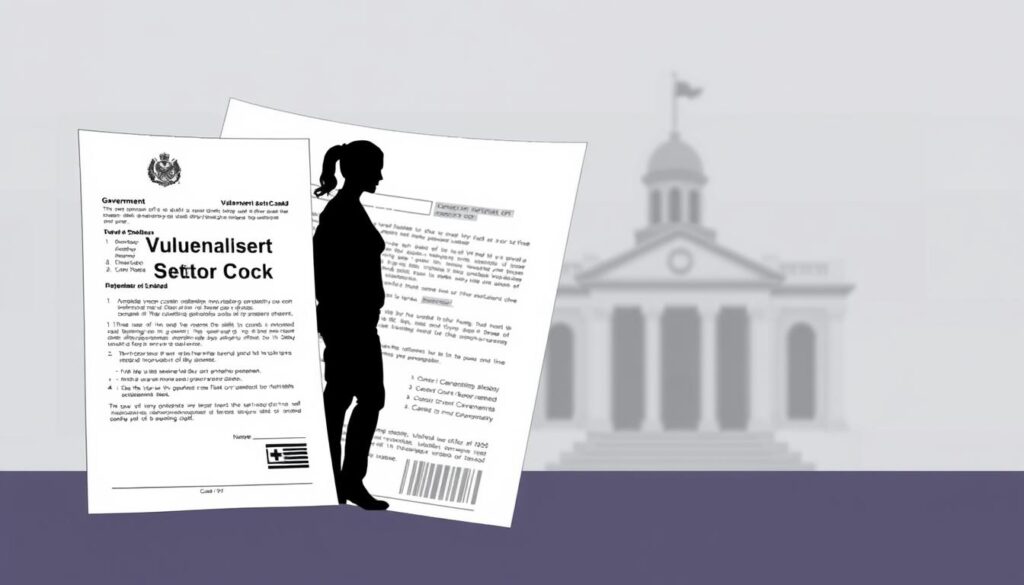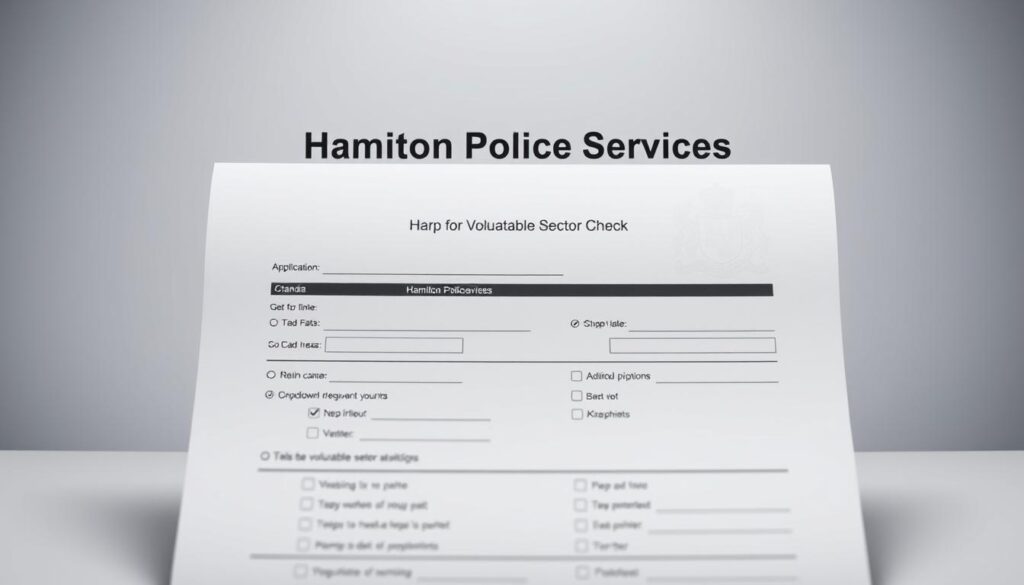Did you know 93% of Canadian organizations working with children or at-risk adults require enhanced background screenings? This strict approach reflects Canada’s commitment to safeguarding vulnerable groups through precise legal frameworks. In Hamilton, these screenings go far beyond standard criminal record reviews.
When applying for roles involving trust or authority, you’ll encounter a specialized process governed by Ontario’s Police Record Checks Reform Act, 2015. This law ensures consistency in what information police services disclose. Your screening may include pardoned offenses, mental health-related court outcomes, and specific non-conviction details if strict criteria apply.
Local law enforcement follows rigorous protocols to validate eligibility. You must provide details about your intended role, employer, and the populations you’ll serve. Positions qualify only if they meet federal definitions of working with vulnerable individuals. Organizations rely on these checks to assess risks while respecting privacy rights.
This system balances public safety with fairness. By understanding its scope and legal foundations, you gain clarity on why these screenings matter. They protect communities while ensuring opportunities for qualified individuals to contribute meaningfully.
Understanding Vulnerable Sector Checks in Canada
Canada’s public safety strategy relies on specialized screenings for roles involving at-risk populations. These measures help organizations verify an individual’s suitability while respecting privacy laws. Only 4% of all police background screenings qualify as the highest-level review due to strict eligibility rules.

What Does This Screening Involve?
This thorough review examines both criminal and non-conviction records. It goes beyond standard checks by including pardoned offenses and mental health-related court outcomes. Law enforcement agencies follow federal guidelines to determine what details get disclosed.
Identifying Necessary Scenarios
You’ll need this screening if your role involves:
- Direct responsibility for children or elderly individuals
- Unsupervised access to people requiring daily assistance
- Decision-making power affecting someone’s well-being
Positions like camp counselors or home care providers typically qualify. However, jobs with brief contact – such as office staff or maintenance workers – usually don’t meet the criteria. Police services legally can’t process requests unless your employer provides proof of eligibility.
This system prevents misuse while ensuring critical protections. By matching screening depth to role requirements, Canada maintains balance between safety and individual rights.
Legal Framework and Eligibility Considerations
Canada’s screening protocols operate within precise legal boundaries to protect both communities and individual rights. Two key laws shape how authorities handle background reviews: Ontario’s Police Record Checks Reform Act, 2015 and the federal Criminal Records Act.

Overview of Relevant Legislation and Requirements
Ontario’s 2015 law standardizes three tiers of background reviews. Each level determines what information police services can legally disclose:
| Check Type | Scope | Common Uses |
|---|---|---|
| Criminal Record | Active convictions | Basic employment screening |
| Criminal Record & Judicial | Convictions + pending charges | Roles requiring financial trust |
| Comprehensive Screening | Full history including pardons | Positions with vulnerable populations |
Your eligibility depends on strict federal criteria. Only roles meeting “position of trust” definitions qualify for the highest-level review. This requires either:
- Regular unsupervised access to at-risk groups
- Authority to make decisions affecting others’ safety
Law enforcement must verify your employer’s documentation before processing requests. You maintain control throughout – results go directly to you first, with options to dispute inaccuracies. Most non-conviction data gets automatically removed after seven years unless specific risks exist.
This framework prevents unnecessary disclosures while ensuring organizations receive legally appropriate information. By matching review depth to responsibilities, Canada maintains rigorous protections without compromising fairness.
vulnerable sector check hamilton
Hamilton maintains rigorous standards for background reviews while streamlining access for qualified applicants. Local procedures align with national safety goals but feature unique administrative steps. Over 80% of applicants complete their screening successfully when following city-specific guidelines.

Local Requirements and Documentation
Start by gathering proof of residency. Current students or long-term residents need two documents:
- Utility bills dated within 90 days
- Lease agreements with official signatures
- Government-issued ID showing Hamilton address
Most requests require in-person visits to police facilities. Contact their office beforehand to confirm payment options – some locations accept only debit or certified checks.
Identifying Eligible Positions of Trust
Hamilton Police Services uses this table to assess role eligibility:
| Position Type | Review Level | Required Documentation |
|---|---|---|
| Youth program coordinators | Full screening | Employer letter + job description |
| Healthcare volunteers | Modified check | Organization registration proof |
| Educational staff | Enhanced review | School board authorization |
“We verify every applicant’s role meets federal definitions before processing,” explains a Hamilton Police Services representative. This ensures screenings only occur for positions involving regular unsupervised access.
Always check their website for updated forms and processing times. Applications missing position details or residency proof face delays. By preparing properly, you help maintain both community safety and efficient service delivery.
Preparing Your Application and Required Documentation

Proper preparation transforms complex processes into manageable steps. Canada’s crime prevention strategy relies on precise documentation to verify identities and role requirements. Start by contacting your local police services to confirm specific needs – requirements vary slightly between regions.
Gathering Necessary Identification and Records
Your application demands three core elements:
| Document Type | Purpose | Examples |
|---|---|---|
| Organizational Proof | Validates role eligibility | Agency letter with position details |
| Identity Verification | Confirms legal name | Passport + driver’s license |
| Supplementary Materials | Supports special cases | Fingerprint records |
“Always double-check your agency code if applicable,” advises a Toronto Police Services representative. Many organizations have unique identifiers that accelerate processing when included.
Tips for Accurate Application Submission
Complete your form in stages. First, print clearly using your full legal name as shown on government IDs. Second, attach copies – never originals – of supporting documents. Third, verify payment methods. Some police services only accept certified checks for background reviews.
Keep a submission folder with:
- Dated receipt from police services
- Copies of all submitted materials
- Contact details for follow-ups
Errors cause 73% of application delays according to RCMP data. Review every detail before submitting. This careful approach protects your opportunities while maintaining public safety standards.
Exploring Police Services and Record Check Information
Canada’s background screening system uses tiered reviews to match security needs with privacy rights. Three distinct police record checks exist under the Criminal Justice Act, each revealing specific details about your history. Choosing the right type ensures compliance while protecting sensitive information.

Differences Between Check Types
Police services provide these screenings based on role requirements:
| Check Type | Details Included | Typical Use |
|---|---|---|
| Criminal Record | Active convictions, Youth Criminal Justice Act findings | General employment |
| Record Judicial Matters | Discharges, warrants, pending charges | Financial roles |
| Comprehensive Review | Mental health rulings, pardoned offenses | High-trust positions |
72% of applicants require only basic criminal record checks according to RCMP data. Judicial matters checks add details about unresolved legal issues. The most thorough review combines both with sensitive non-conviction data.
Understanding Processing Times and Fees
Wait periods and costs vary across provinces:
| Service Type | Average Time | Typical Cost |
|---|---|---|
| Standard Review | 3-10 days | $25-$50 |
| Judicial Matters Check | 2-3 weeks | $40-$75 |
| Enhanced Screening | 4-12 weeks | $60-$100 |
Volunteers often qualify for fee waivers if providing organization proof. Employment-related requests usually require full payment. “Always confirm local police service requirements first,” advises a Public Safety Canada representative. Seasonal spikes in August and January may delay results by 10-14 days.
Practical Steps to Complete Your Check
Navigating the final steps of your background screening requires strategic planning. Police services across Canada handle requests differently, so understanding local protocols saves time and reduces stress.
Scheduling Your Appointment
Start by contacting your local police service immediately – some regions face 12-week delays during peak seasons. Many offices offer online booking through their official website, while others require phone calls or in-person visits.
Confirm whether walk-in applications are accepted. This varies between regions and affects your timeline. If you’re under 18 years of age, discuss alternatives with your organization – law prohibits issuing these screenings to minors.
Prepare your documents before arrival. Bring payment options accepted by your local police service, valid ID copies, and employer letters. Keep your receipt as proof of submission – it helps track progress if delays occur.
Double-check processing timelines when booking. Some services expedite requests for urgent roles. Always verify current requirements on their website to avoid last-minute surprises.
Following these steps ensures you meet safety standards while accessing meaningful opportunities. Proper preparation protects both community well-being and your professional goals.

